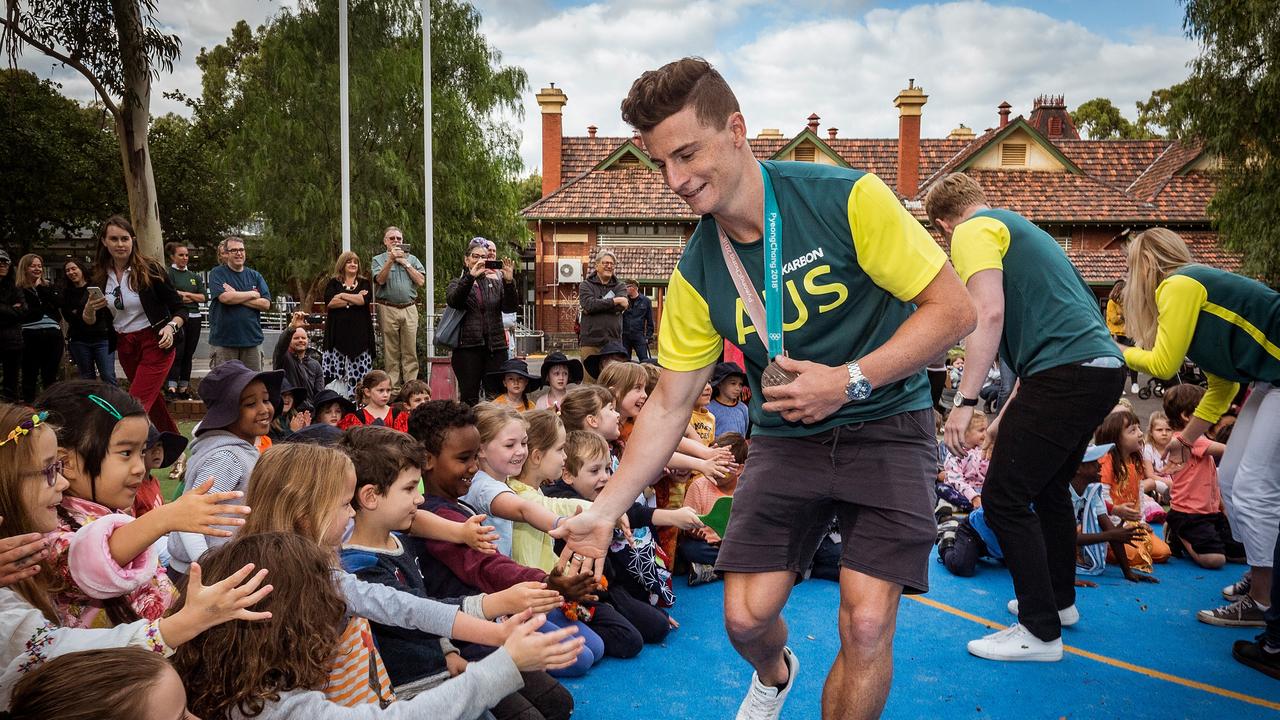Winter Olympics 2018 Day 9: David Morris, Russell Henshaw lead Aussie charge
David Morris says no one should be disappointed for him despite a controversial exit from the aerials final in PyeongChang.
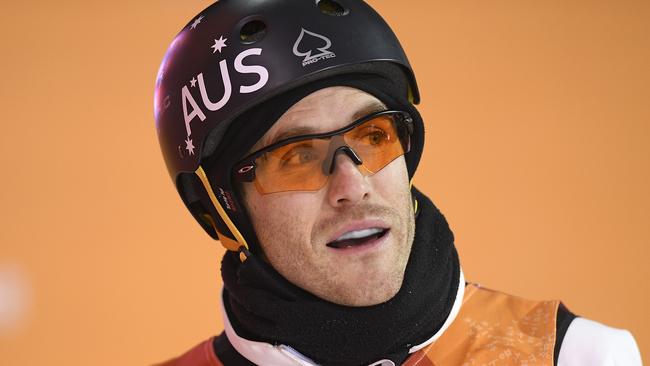
Sochi silver medallist David Morris missed out in controversial circumstances on a night of high drama on the mountain. See how Day 9 unfolded below.
Jacquelin Magnay 11.39pm: Morris’ message to his mother
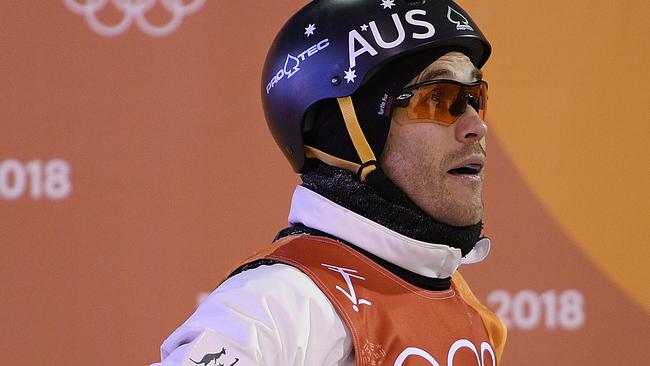
To his mother, Morris sent a message: ‘’I am safe, I am healthy I am in one piece, I am alive, we can deal with everything as a family now because I have been putting it off for months ... would be good to become more of a real person and less of a selfish athlete who just has to consider themselves.’’
Morris said dealing with “a really sad life event is a really hard one’’ and admitted to being heartless in trying to ignore that pain.
But he said his family had told him “don’t come home go to the Olympics and we will deal with it later’’
Morris said he said had seen Jia crash and was surprised at the higher scores the Chinese skier received.
“I thought I was in,’’ he said.
“My coach went up to the judges and questioned them on it, and said they gave him four metres of controlled skiing which is what you need on landing, so he bobbled like me but he stood up and they discounted the last part because it was not part of the jump.
“Unfortunately we can’t argue against it because thats the rule, thats fine. I would love it if it was ten metres or he had to ski out the whole zone, but thats the way it goes.
“We tried our best, 10th is a pretty sweet result, we are in the Olympic final and that is awesome.’’
11.18pm: Was Zongyang robbed for gold?
Can you believe it? More drama! Zongyang nails his final jump and looks set for gold, but he misses out by less than half a point, having to settle for silver. Oleksandr Abramenko takes out gold for Ukraine. Some will say that’s karma, but regardless it has been a highly dramatic night on the mountain.
10.53pm: Morris reacts to judging disappointment
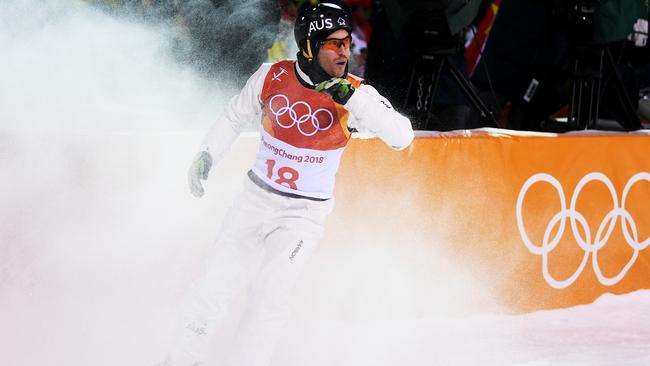
He might’ve missed out on getting another medal, but Morris was typically humble after failing to qualify for the final nine.
“It’s a little disappointing,” he told Channel 7. “But people have come here to watch some something spectacular.”
When asked about Zongyang’s jump, Morris said he was as confused as many others were watching on.
“I think a couple of us are confused about that. They gave him the four metres where he had control ... It is what it is.”
Gracious in defeat. Davis Morris is all class.
— 7Olympics (@7olympics) February 18, 2018
Congratulations on an amazing Olympic career, David ðŸ‡¦ðŸ‡ºðŸ™Œâ›·ï¸ #Olympics pic.twitter.com/VuFK0NTldR
While his mother has been diagnosed with lung cancer, Morris is remaining upbeat, but said emotions got the better of him.
“I had a little cry up the top there, finally allowed myself to get sad about mum and all that stuff. I’ve been holding that in for a long time, not letting it to get to me. I didn’t allow myself to get emotional. I finally let it out and I’m starting to deal with real life.”
But he reiterated he would be fine, saying he’s in a “good place”.
“No one needs to be disappointed for me. I’m in a really good place. I’m really happy with how I’ve done this whole year. I haven’t had heaps of results. Olympic finals is great. Doing five twists on snow is great.”
10.32pm: Morris bows out in controversial circumstances
The full 🇨🇳 Jia Zongyang jump. He scores 118.55, edging out 🇦🇺 David Morris' 111.95.
— 7Olympics (@7olympics) February 18, 2018
Do you agree with the score?#Olympics pic.twitter.com/ZBwguu2EUm
No! Morris finishes 10th, after the US’ Jonathon Lillis scored 121.68 to move to 7th and take the last spot in the top nine that go through. Agonising for the silver medalist from Sochi. How did this jump from Jia Zongyang — who finished 9th — score higher than Morris’? Zongyang scored 118.55.
10.18pm: Aussies’ quick start
THE GREEN AND GOLD MACHINE âš¡ï¸
— 7Olympics (@7olympics) February 18, 2018
🇦🇺 David Mari & 🇦🇺 @mata_lucas have run in 49.88 in the first heat.
A rapid start for the boys in the #bobsleigh
Watch it live in the app 👉 https://t.co/5HDGT7gk34 pic.twitter.com/xodkE6zNIT
Meanwhile, in the bobsleigh, David Mari and Lucas Mata have had a fair start with a run of 49.88 in the first heat.
10.09pm: Morris nails first jump
Now THAT is strength 💪@Aerialskier puts down 111.95 on his first jump! Should be good enough to progress...
— 7Olympics (@7olympics) February 18, 2018
Watch 👉 https://t.co/5HDGT7gk34 #Olympics pic.twitter.com/cPUh9Luz8c
Brilliant start for Morris, with the former gymnast nailing it despite almost losing his balance. He scores 111.95, taking him to third as it stands. He should go through.
10.05pm: Men’s aerials final begins
99.12 for Mischa Gasser. @Aerialskier's first run coming up soon!
— 7Olympics (@7olympics) February 18, 2018
Watch 👉 https://t.co/5HDGT7gk34 #Olympics pic.twitter.com/FhK9Pcjfus
We’re underway in the men’s aerials finals. Mischa Gisser kicked things off with 99.12, let’s see what Aussie David Morris can produce!
8.50pm: How about this for a save?
Clutch save by Nana Fujimoto!
— 7Olympics (@7olympics) February 18, 2018
1-1 with a minute to go...#Olympics pic.twitter.com/EbwetlBAsd
The deadlock can’t be broken ... yet.
7.55pm: Heat on the ice
Lisa Johansson puts on the afterburners to level the score 1-1 🔥
— 7Olympics (@7olympics) February 18, 2018
Watch 👉 https://t.co/5HDGT7gk34 #Olympics pic.twitter.com/q1z3hLU7AE
How’s this for some serious speed? Lisa Johansson levelled scores in Sweden’s clash with Japan in fairly impressive style.
7.20pm: Norway’s cross-country dominance
Norway has continued its dominance in cross-country skiing by winning the gold medal in the men’s 4x10-kilometer relay.
The team of Didrik Toenseth, Martin Johnsrud Sundby, Simen Hegstad Krueger and Johannes Hoesflot Klaebo won the race in 1 hour, 33 minutes and 4.9 seconds to beat the second-place Russian athletes by 9.4 seconds. France captured the bronze.
Norway has now won five of the eight gold medals awarded in cross-country at the PyeongChang Games, and 11 medals overall. The record for most gold medals in cross-country in a single Olympic Games is 13, set by the Soviet Union in Calgary in 1988.
Krueger battled back from 24.5 seconds down at the midway point of the race to give Norway the lead. Klaebo took it from there, pulling away from Russian anchor Denis Spitsov in the final 1.5km to deny the Russians their first PyeongChang gold medal.
Sweden had won this event in the previous two Olympics but finished in fifth place more than 2 minutes behind.
AP
6.40pm: ‘I still can’t walk up and down stairs’
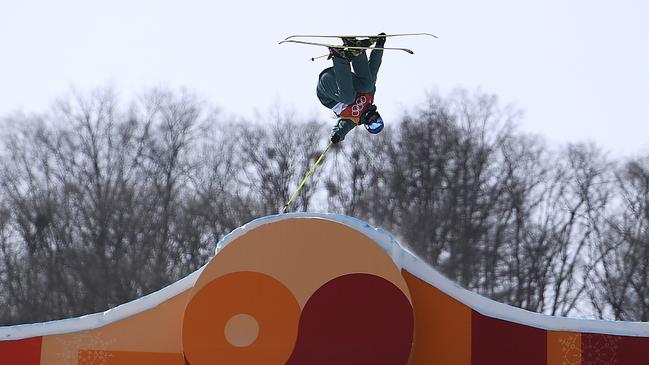
Russ Henshaw couldn’t walk up or down the stairs but still managed to complete moves with 1260 degrees worth of spins, jump off rails and ski backwards on Sunday.
The slopestyle skier literally hobbled into the PyeongChang Winter Olympics and then hobbled out again as he finished 19th and failed to qualify for the event’s finals.
It had been a tough lead-up for the 27 year-old who had to get a medical clearance just to compete in PyeongChang.
A pioneer in the sport and a former X Games silver medallist and two-time podium finisher at the world championships, Henshaw has had a litany of knee issues. He’s torn his ACL three times and experienced issues with his left knee in the lead-up to the Games.
A doctor in California told him to forget about these Olympics but he sought a second opinion in Sydney.
There he discovered that it was a less serious meniscus tear with bruising so he decided to plan for competition.
His two-week lead-in involved icing his knee on and off every hour. “To get there after all I have been through over the last two weeks was just a surreal feeling in itself,” Henshaw said.
“It has been an emotional and physical rollercoaster.” It was a similar story before Sochi four years ago, Henshaw having some knee problems and sustaining a heavy crash in competition two weeks before the event. There he finished eighth.
Looking stiff and unable to go as big off the jumps as many of his competitors on Sunday, Henshaw did well to log two clean runs but never looked like pushing for qualification to the final.
“Up until today I still can’t walk up and down stairs,” he said. “This was all muscle memory for me.” Norway’s Oystein Braaten (95) won the event ahead of American Nick Goepper (93.6) with Canada’s Alex Beaulieu-Marchand (92.4) third.
Meanwhile in the men’s giant slalom Dominic Demschar finished 33rd with fellow Australian Harry Laidlaw disqualified after failing to finish his first run.
AAP
6pm: Ligety’s poor title defence
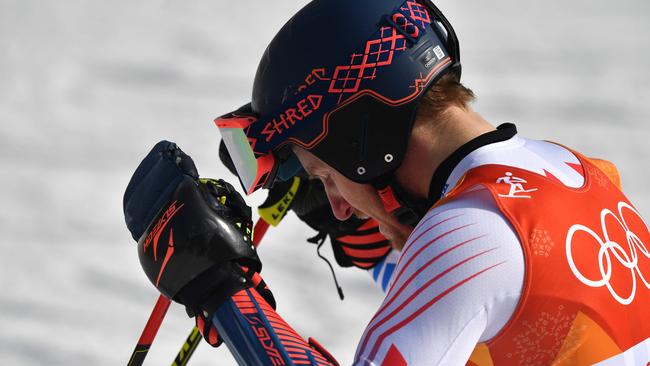
Ted Ligety’s defence of his Olympic giant slalom gold medal has ended with a 15th-place finish behind Austrian Marcel Hirscher.
Ligety knew he hadn’t turned in the best opening run, but what he couldn’t tell as he was heading down the hill was just how poorly he’d done. The American says he was “really surprised” when he saw his time. He says, “It didn’t feel like I crushed it,” before adding with a chuckle: “But it didn’t feel 2 seconds bad.” Ligety lost more ground to Hirscher in the second leg Sunday and ended up tied for 15th place, 3.21 seconds slower than the winning time of 2 minutes, 18.04 seconds.
Ligety says it was “a really bad day and time to not ski up to the level I wanted to.”
AP
5.15pm: Germany edge past Norway
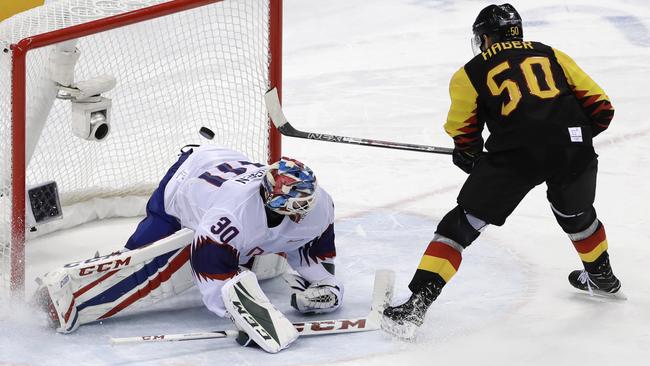
Patrick Hager scored in regulation and again in a shootout as Germany beat Norway 2-1 to wrap up group play at the PyeongChang Olympics. Danny aus den Birken made 28 saves and stopped all three shots he saw in the shootout .
Germany opened the scoring on a power play in the second when Hager took a pass from Dominik Kahun and stuffed the puck past goaltender Lars Haugen. Norway tied the game in the third period. Both teams played cautiously in overtime, with Norway failing to capitalise even with nearly two minutes on the man advantage.
Haugen made 36 saves but didn’t stop a shot in the shootout. Both teams face elimination games Tuesday to get into the quarterfinals.
AP
5pm: Hirscher takes gold
.@MarcelHirscher wins his second Olympic gold 🥇
— 7Olympics (@7olympics) February 18, 2018
The Austrian clocks a total race time of 2:18:04 to beat out Henrik Kristoffersen and Alexis Pinturault.#Olympics pic.twitter.com/9ACwtsp0Uh
Marcel Hirscher has won the Olympic men’s giant slalom. It’s his second gold medal at the PyeongChang Games.
The 28-year-old Austrian star extended his first-run lead to win by a huge margin of 1.27 seconds over hard-charging Henrik Kristoffersen of Norway. Kristoffersen rose from 10th-fastest in the morning.
Bronze medallist Alexis Pinturault of France finished 1.31 behind Hirscher’s two-run time of 2 minutes, 18.04 seconds.
Hirscher can complete a sweep of three individual titles in his best event, the slalom, which is scheduled for Thursday.
Hirscher also won the Alpine combined Tuesday. Pinturault took silver in that race.
AP
4.15pm: Organisers ‘happy with turnout’
Amid talk of unsightly empty seats and furious efforts to fill them, ticket sales for the PyeongChang Olympics have exceeded 1 million. Local organising committee spokesman Sung Baik-you says the 1 million mark exceeds expectations - 692,443 people attended games venues from February 9 to February 17, and there’s still about a week remaining.
Sung says, “Our target was 1,068,000, so we don’t have many tickets remaining.” Attendance peaked Saturday, with 146,506 people attending on a holiday for the Lunar New Year. There were long delays in traffic around PyeongChang on a holiday that usually is the busiest on Korean roads every year, but games organisers weren’t disappointed.
Sung acknowledges traffic jams and bus operation interruptions but says, “Nonetheless, I think we can say we were successful in attracting spectators, so it was a positive thing.”
It comes amid reports that organisers, reeling from the eyesores created by sparse attendance in the event’s first week, are blasting the airwaves with ads, hosting daily K-Pop concerts and asking local schools for help. Across the country, local municipalities have vacuumed up group tickets and offered them free to residents.
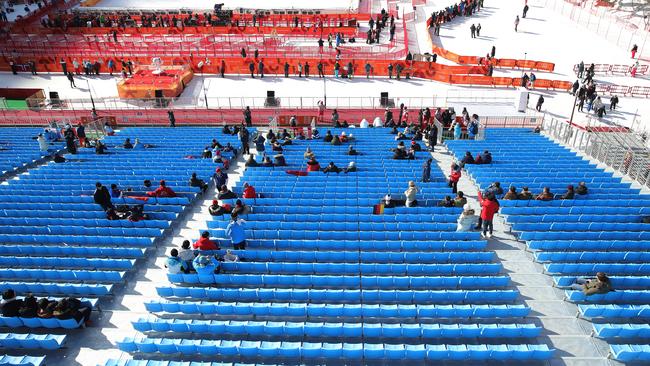
3.45pm: Citzenship drama? Not here
There’s a Russian skating for Australia who at first thought she was headed to Austria.
Two Americans are ice dancing for host South Korea. Another American is competing for Brazil. Four members of the Israeli team are not natives. The German pair that won the gold medal has a woman, Aliona Savchenko, from Ukraine, and a man, Bruno Massot, from France.
And get this: a Brit and an Aussie are entered in ice dance representing the Russians, who once ruled that discipline.
Some three dozen skaters in the PyeongChang Games are performing for nations in which they were not born.
“Nine years ago, I retired from figure skating,” says Israel’s Alexei Bychenko, who previously represented his homeland, Ukraine. “After Vancouver (Olympics in 2010, which he did not qualify for), I took one year break, and then my coach called me and asked if I wanted to skate in an Olympics? I couldn’t do it for Ukraine, but we talked about my options and that I have a Jewish family. “Then I knew my route.”
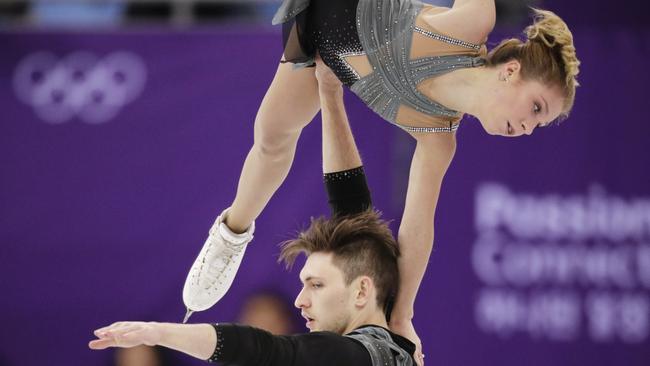
Bychenko contacted the Israeli federation - the country has made great strides in the sport - and was told it was doable. He began to train there, got his citizenship and wound up 11th in the men’s event.
His “countrymen,” Adel Tankova and Ronald Zilberberg, will ice dance this week. She is from Ukraine and has Jewish roots, too.
“We trained at the same place,” he says. “I had another partner in dance, and Adel had another in pairs. We broke up with each partner and our coach said ‘Why not try it?’ For dance, not pairs; me jump? No, no, I can’t jump for my life.
“Finding a new partner is really hard, especially if you want to skate for Israel. You have to find someone who has the same heritage to go to the Olympics.”
Russian Ekaterina Alexandrovskaya skates pairs Down Under with Harley Windsor, though she at first thought she was headed to Vienna, not Sydney. “My coach told me they had a partner for me in Australia and I thought it was Austria. I didn’t understand: Austria or Australia when I tell my mom,” she explains. “One month later, I go to Australia. My mom stay in Moscow. I didn’t speak English, except maybe ‘Hey, how are you?”’ It has worked out: They won the world junior crown in 2017.
They practice for three months in Australia, then three months in Moscow. “We are going back soon; I can’t wait to see my mom in Moscow,” Alexandrovskaya says.
2.50pm: Super-G miracle on second-hand skis
Ester Ledecka won her shock super-G Olympic gold medal on skis previously owned by American double World Cup champion Mikaela Shiffrin, the Czech skier and snowboarder’s coach confirmed.
Moments after 22-year-old’s unlikely triumph, the origin of her skis remained unclear with Ledecka telling a post-race news conference: “I hope these are mine.”
Speaking to Reuters Television, her coach Tomas Bank said they had been using Shiffrin’s old skis for about 18 months and they were the fastest pair in testing before Saturday’s race.
“We take some new skis and also some used skis and yes, it was Mikaela Shiffrin’s skis,” he said of the equipment that formerly belonged to the American slalom specialist, who has won two Olympic gold medals. “Our serviceman waxed them a lot of times. We skied them and tested them and... they were fastest so we used them,” Bank said at Czech House, where fans were celebrating the country’s first ever Alpine skiing gold medal. Ledecka, meanwhile, opted for a quiet night to prepare for her snowboard event next week, a discipline she was better known for prior to he shock win, having become the first Czech to win the parallel giant slalom World Cup in the 2015-16 season.
Few expected her snowboarding success to translate to the dramatically different sport of alpine skiing, where Ledecka entered the super-G ranked 43rd in the World Cup standings.
“Yesterday she was a better snowboarder, but today, maybe she is a better skier,” Bank said.
2.15pm: ‘He’s on one knee’
The ski slopestyle hopes of Russell Henshaw are over after his second qualifying run netted a score of 64. The Australian’s first run of 72.6 is good enough for 19th so far, meaning he will miss the 12-man final.
Henshaw has battled with a knee injury, which compounds the fact he’s had several reconstructions. He was clearly limited at the end of his second run but managed to stay upright despite being in obvious pain.
It's a 64.00 in the second run for #AUS @RussHenshaw.
— 7Olympics (@7olympics) February 18, 2018
He'll miss out on the ski slopestyle finals, but a great effort nonetheless ðŸ‘#PyeongChang2018 #FreestyleSkiing pic.twitter.com/HoP1fRQYcf
1.50pm: Painful exit
Australia’s second entrant in the giant slalom, Harry Laidlaw, was unable to negotiate his qualifying run.
Ouchhh #AUS Harry Laidlaw not the way he would have wanted to go down the hill! #AlpineSkiing #giantslalom #PyeongChang2018 pic.twitter.com/0xumh6fOKC
— 7Olympics (@7olympics) February 18, 2018
1.30pm: Safely down the mountain
Australia’s Dominic Demschar has tackled the giant slalom course, where Marcel Hirscher of Austria has taken the lead after a big first run. Hirscher was 0.63 seconds faster than Alexis Pinturault of France in the early running. They finished 1-2 in the Alpine combined on Tuesday.
#AUS Dominic Demschar in the #AlpineSkiing #giantslalom 😀#PyeongChang2018 pic.twitter.com/ZKNbNLmPcS
— 7Olympics (@7olympics) February 18, 2018
1pm: Slopestyle masters
The first run of the men’s slopestyle qualification is just about done, and Australia’s Russell Henshaw is in decent shape, sitting 12th out of 30 competitors. The top 12 will progress to the final after the second run is complete.
Get it @RussHenshaw #AUS 🤙
— 7Olympics (@7olympics) February 18, 2018
A solid 72.60 in first qualifying, ready to step it up in run two.#PyeongChang2018 #FreestyleSkiing pic.twitter.com/qlv6iu3aB7
12.30pm: Giant challenge
A pair of Australians, Dominic Demschar and Harry Laidlaw, will pit their skills against the best in the giant slalom.
The number of gates for men is between 56-70, with an altitude drop of 300-450m. The discipline is raced over two runs on the same slope, with the starting order for the second run dependant on results from the first run: the skier placed 30th will start, with the leader running last.
Skiers do not have the chance of a pre-race training run, only a 45-minute visual inspection on the morning of the race.
#Giantslalom has started! #AUS Dominic Demschar + #AUS Harry Laidlaw are on today 💪
— 7Olympics (@7olympics) February 18, 2018
Get behind them and watch it 👉 https://t.co/5HDGT7gk34 #Alpineskiing #Olympics #PyeongChang2018 pic.twitter.com/c9uUuYQJ8Z
12pm: Backward in going forward
Australia’s Russell Henshaw will soon take part in the first qualifying run of the ski slopestyle qualification.
And we're off! #USA McRae Williams gets the men's ski slopestyle qualifications off to a clean start 👌 #PyeongChang2018 #FreestyleSkiing #7Olympics pic.twitter.com/0rQCy2dPB4
— 7Olympics (@7olympics) February 18, 2018
11.30am: What to look forward to
The world’s best male Alpine skier, Marcel Hirscher, will compete for his second gold medal of these Games. Hirscher starts as the favourite in the giant slalom today at Yongpyong Alpine Center. He’s already got a gold medal from his first event, the Alpine combined. The 28-year-old Austrian is expected to duel with his main rival in World Cup races, Henrik Kristoffersen of Norway. American Ted Ligety will try to defend the title he won at the 2014 Sochi Olympics.
Also today, there are men’s preliminary-round hockey games between Canada and Korea and between Finland and Sweden, among others. In women’s hockey, Switzerland will play Korea and Sweden will play Japan, though none is a medal contender.
And the bobsled competition kicks off with the first heats for the men’s two-man teams, with medals to be awarded Monday.
11am: Hard landings
Stacks, stacks and more stacks 💥
— 7Olympics (@7olympics) February 18, 2018
This is what happens when things go wrong at #PyeongChang2018 #7Olympics pic.twitter.com/u3OzafitaL
10.30am: Broadcaster caught out
Athletic miracles do happen, and the one performed by little-known Ester Ledecka of the Czech Republic on Saturday caught NBC flat-footed. Toward the end of the women’s super-G competition, NBC’s Dan Hicks declared Austria’s Cornelia Huetter as the only skier with “any real chance” of beating teammate Anna Veith. When Huetter fell short, Hicks said that “it’s Anna Veith of Austria who repeats as Olympic super-G champion.”
That made it four straight Olympic gold medals in that discipline for Austria, he said. As the pictures showed an emotional Veith, Hicks said she “just about can’t believe it.”
After a commercial, NBC switched to figure skating, leaving viewers with the impression that the race was over. It wasn’t. NBC had to break in later with the news that Ledecka had beaten Veith, and showed her winning run.
There’s no shame in thinking Veith was the probable winner and the broadcast moving on; even Ledecka was stunned by her win. After Huetter’s run, The Associated Press wrote that Veith was “on the brink” of defending her gold medal. But probable isn’t the same thing as certain, and Hicks was burned.
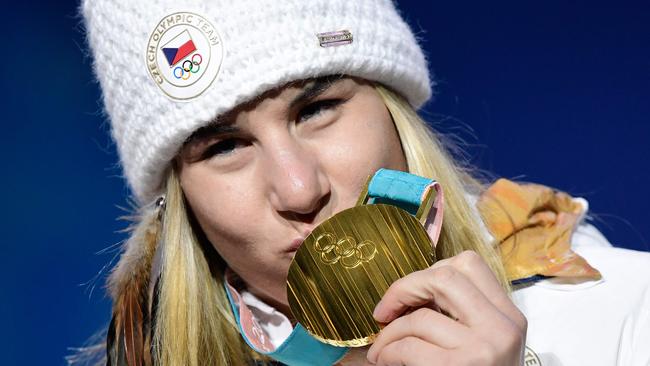
10.15am: Coming up empty
Organisers of the Winter Games are enlisting the help of pop stars and schoolkids to try and get people to attend events, as swathes of empty seats cause embarrassment. Full story here
10am: A second shot at glory
Deanna Lockett’s favoured 1500m didn’t go to plan but the Australian short track speed skater is taking heart for her 1000m campaign.
After placing second in her heat, Lockett crashed out in the semi-finals of the event, in which she’s ranked seventh in the world, at the Winter Olympics in PyeongChang.
The 22-year-old was caught behind the pack on the last lap and clipped as she tried to make up ground, sending her sliding into the wall.
She said her race strategy almost came off.
“I think I got myself into a really good position,” Lockett said. “I moved up into fourth, so that’s where I wanted to be and then I wanted to have a big attack.
“I got there, but I just couldn’t get myself into the pack.” Lockett was a quarter-finalist in the 1000m on her Olympic debut in Sochi four years ago.
While having had less success in the distance, she was encouraged by being able to move within striking distance in Saturday’s race.
“I moved up when it was a fast pace right at the end,” she said. “I had the power there so it gives me confidence that I can move up in the race at any time in the 1000.”
Lockett will contest the 1000m from Tuesday.
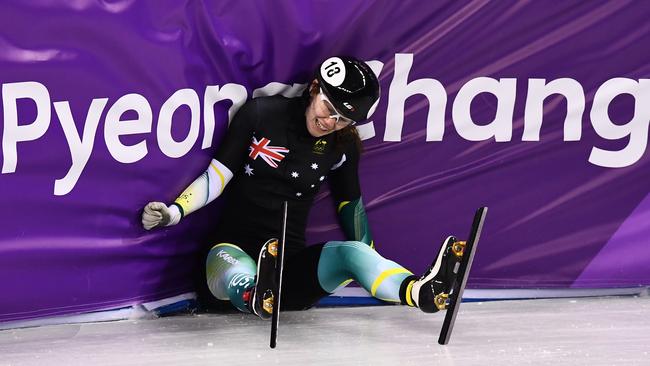
9.30am: Rippon wraps it up
Adam Rippon put his hands over his face and let the cheers wash over. He waved and smiled, and when the crowd kept clapping, he jumped where he stood and swung his arms to egg them on.
Ever the showman, and with his trademark grace and flair, Rippon has taken his final skate of the PyeongChang Olympics. He finished 10th, a fine result for a 28-year-old who was never expected to medal against a field populated by younger, higher-flying competition.
The self-proclaimed “icon” didn’t need that hardware to leave his mark on these games.
Or for the Olympics to leave its mark on him.
Rippon has been the headline-grabbing darling of the PyeongChang Games, a status earned in part with his near-flawless skating, but even more with his efforts off the ice.
He and skier Gus Kenworthy are America’s only two openly gay male athletes, and they’ve flaunted their LGBT pride on social media throughout the Olympics.
Rippon’s path to PyeongChang included a public spat with Vice President Mike Pence, whom the LGBT community considers an opponent for signing the Religious Freedom Restoration Act in March 2015 as Indiana’s governor. Critics said the legislation encouraged discrimination against gay people. An amendment with protections for the LGBT community was passed a week later.
Rippon criticised the White House in January for choosing Pence to lead its official delegation for the opening ceremony. When a USA Today report said Pence was hoping to sit down with Rippon, the figure skater said he had no interest in meeting with Pence until at least after the games.
The “brouhaha” - Rippon’s word - mostly dissipated as he made his Olympic debut. He helped the Americans win a bronze medal in the team event, then put on a pair of clean skates in the individual competition.
ICYMI: 🇦🇺 Brendan Kerry scored 150.75 in his free skate program for a total score of 233.81. ðŸ‘ðŸ‘
— 7Olympics (@7olympics) February 17, 2018
Watch all the #figureskating highlights 👉 https://t.co/5HDGT7gk34 pic.twitter.com/jd273EAZqE
9am: US may need another miracle
The blistering pace on the ice and the atmosphere in the arena was reminiscent of the epic showdown between the United States and Russia in Sochi four years ago.
That’s where the similarities end.
When the teams met again at the Olympics without NHL players, Ilya Kovalchuk and the Russians put on a clinic — outplaying, outhitting and outclassing the US in a 4-0 shutout.
The US must now play in the qualification round Tuesday, while Russians finished first in the group and move on directly to the quarter-finals, hoping their dominance puts T.J. Oshie’s shootout performance in 2014 further in the rearview mirror.
“After the last game in Sochi, I think you guys are still showing the highlights of Oshie scoring those shootouts, right?” Kovalchuk said. “So hopefully you’re gonna change that now.”
Russians Kovalchuk, Pavel Datsyuk and Slava Voynov and US coach Tony Granato are the only people back from that game, which had higher stakes because of the NHL talent.
There’s still plenty at stake this time with the U.S. looking to win its first Olympic gold medal since the “Miracle On Ice” in 1980.
This night lacked the tense political subtext of the Cold War from their 1980 meeting and the pomp and circumstance of Russian President Vladimir Putin attending and the pressure on the home team in Sochi in 2014, but it had the same kind of in-arena atmosphere.
U.S. and Russian fans filled Gangneung Hockey Centre and went back and forth with “U-S-A” and the “ROSS-I-YA” chants that made up the background noise at the Olympics four years ago.
Entering the game, the Russians looked as if they had better players than the US, and that showed in each team’s final preliminary-round game. The US college players who shined in the first two games engaged in the physical play against the Russians but couldn’t make an impact on the score sheet.
This one couldn't end fast enough for the #USA
— 7Olympics (@7olympics) February 17, 2018
The #OAR have a made a huge statement in the #icehockey winning 4-0!!#PyeongChang2018 pic.twitter.com/bAvhE0UzwF
8.30am: Aussie leaves it late
Master tactician David Morris is eyeing off a repeat of his Sochi shrewdness as he seeks to claim Australia’s fourth and potential final medal of the Games.
The aerial skier had to do it the hard way in qualifying for Sunday night’s finals, coming through the repechage round to make the 12-person decider. But he ultimately did it in style; moving through in second (124.89 points) from the second group of six qualifiers.
It was the equal-fifth highest score of the night.
That all goes out the window for the three-leg final competition which goes from a dozen skiers to nine and then a decider for the top six.
“It was great and I was really relieved to get through the qualification as it’s the most stressful part of the competition,” Morris told Channel 7. “You have to beat more than half the field to get through and then from now on in the finals it’s just beating three and you can sneak through with some clever strategy.” It’s a scenario he knows well.
Because skiers can’t repeat their tricks across the three finals they have to make judicious decisions about what jumps to pull out and when given a limited range of options.
How good was this guy last night? We'll answer for you... SO GOOD!
— 7Olympics (@7olympics) February 17, 2018
Relive this moment 🇦🇺 David Morris - Aerial Skier booked his place in the final 🤘#Pyeongchang2018 pic.twitter.com/sOwY5SXS6y
Morris had played that beautifully in Sochi four years ago; qualifying last into what were eight then four-man finals.
It left him with a little more in the bag for the decider.
While the gold was effectively out of reach to Belarusian Anton Kushnir, Morris had neatly landed his trick thinking his competitors would go big in order to win.
He was right and claimed silver.
This time around he has a little more to give with a quin-twisting triple somersault that only three others in the field are thought to possess. “It’s going to be interesting,” he said.
“Chance in the finals five twists are going to come out. I’m going to practise it in training and I hope you guys get to see that skill because it is something.” Morris has had a rough few months after tossing up pulling out of the Games because his mother is battling cancer.
His World Cup form has also been down but he’s been strong in training and is a noted big-event performer having also captured bronze at last year’s world championships.
A medal would ensure the Australian aerials team does not walk away empty-handed from a Winter Olympics for the first time since 1998.
It looms as one of the best remaining chances for Australia who may struggle to get another medal elsewhere in PyeongChang.
8am: Day 9 — Aussies to watch
FREESTYLE SKIING
* 12pm: Russell Henshaw (men’s ski slopestyle qualifiers, heats, finals)
* 10pm: David Morris (men’s aerials finals)
ALPINE SKIING
* 12.15pm: Dominic Demschar, Harry Laidlaw (men’s giant slalom)


